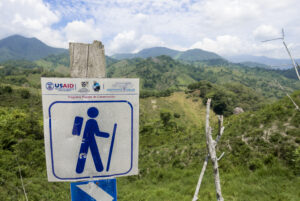Congress is moving forward with a deeply flawed Free Trade Agreement (FTA) with Colombia. Yesterday, the FTA passed the House Ways and Means Committee, and it is likely to be introduced for a vote in Congress next week. Representative Sander Levin expressed dismay at yesterday’s mark-up and declared that “the U.S.-Colombia FTA remains fundamentally flawed.” Violence and intimidation of labor movements in Colombia silence those that defend their basic labor rights. One striking example of the systematic abuse of workers in Colombia is the practice of subcontracting in the sugarcane sector.
Sugar costs about $2 per pound in most U.S. grocery stores. However, sugarcane cutters earn less than $4 for every ton (2,200 pounds) of sugarcane that they cut. These men and women work over nine hours a day under very difficult conditions, often without any health insurance or sick leave. Sugarcane cutters can bring in about 5.3 tons in a day even under these exploitative working conditions.
Surprisingly, most sugarcane cutters are not directly employed by the sugarcane refineries. Instead, they are employed by subcontractors that take a cut from their income and are supposedly responsible for their wellbeing. The sugarcane refineries therefore have no legal obligation to respect the workers’ most basic labor rights. This abusive subcontracting model, previously used by Associative Labor Cooperatives (CTAs), is replicated in several industries in Colombia including the palm, mining, port, and even health sector.
Demands from Colombian workers and international pressure have forced Colombia to reassess labor subcontracting. In early 2011, Colombia passed a law banning CTAs, and Presidents Obama and Santos signed the Labor Action Plan on April 15 which commits Colombia to assigning 100 inspectors that must investigate abuses by CTAs. However, these laws and agreements fall short of banning the exploitative subcontracting model.
The banned CTAs are quickly being replaced by SAS (Simplified Stock Companies): different acronym, same middle-men. “Meet the new boss; worse than the old boss,” as Representative James McGovern said in remarks to the House on October 3rd, describing the broken labor model in Colombia. Hence, the Colombian law banning the CTAs papers over problems, rather than improving working conditions.
To make matters worse, Colombian labor leaders are systematically targeted for defending their rights. This year alone, twenty-two trade unionists have been killed. Threats and harassment of labor leaders is common. An egregious example happened three weeks ago, when José Oney Valencia, a leader of the sugarcane cutters’ movement, was arrested on September 24 in Cali at an event organized by sugarcane workers. Agents of the DAS, Colombia’s scandal-ridden intelligence agency, used a faulty arrest warrant and detained him in a clear act of intimidation. Colombia’s Vice President, who was at the meeting, described the turn of events as “harmful, not only to workers, but to the population’s confidence in the State.” We couldn’t agree more.
In the midst of the debate regarding the Colombia Free Trade Agreement, most of the U.S. Congress has convinced itself that lofty agreements have translated into tangible change. In practice, the labor rights situation in Colombia has not improved. Colombian Senator Alexander Lopez Maya proposed a law that will terminate the labor subcontracting model in Colombia.[1] The U.S. government should uphold labor standards by supporting the Lopez Maya proposal and defending Colombian workers, rather than heighten their vulnerability by passing a damaging free trade agreement.
By Anthony Dest, WOLA

